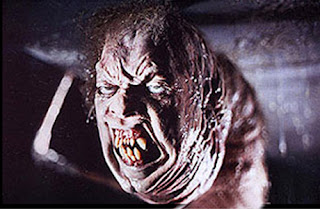The plot behind Syriana, while comprehensible, is very complex, so I'm not going to waste any time detailing it. It would take me forever and you wouldn't want to read it anyway, since this is a film where paying attention to the story is the only way not to get lost. The basic idea is that the world dependency on foreign oil is bad for a number of reasons. Way to take a stand, Hollywood. It also addresses the need for oil states to develop their own identities, the effectiveness of the CIA, and the costs/benefits of high-level corruption. What makes Syriana interesting is that it chooses to handle these issues simultaneously, so we can see how each issue impacts another. You won't see how everything fits together for some time, as there are four storylines that exist largely independent of each other until the final quarter of the movie. When they dovetail together, though, you are left with something to think about. Or not. One thing that everyone can agree on is that this is definitely not an action movie.
 |
| I did a Google Image search for "syriana action" and found this. |
 |
| This is not Ocean's 14 |
There is a fourth storyline that addresses the plight of immigrant workers in the Middle East and the allure of militant Islam. Of the three actors in this story, only the missile-buying militant (Amr Waked) acts with any sort of regularity, and it shows. The two innocent youngsters are played by two innocent actors without much more than half a dozen visible emotions between them.
And then there's the rest of the cast. In George's storyline, William Hurt does his typical good acting thing as a confidant and Mark Strong plays a very very bad man. Both roles are easily within the acting range of these men, but it was nice to see them handled so well. In Damon's story, Amanda Peet plays his wife; while not a particularly strong role, she didn't screw it up, which is much better than Peet's leading roles. I thought Alexander Siddig was very likable as the progressive-minded Prince Nassir, possibly the most positive portrayal of a Middle Eastern Muslim I have seen in years. In Wright's story, Chris Cooper plays a domineering business owner with an abrasive personality (shocker!), Christopher Plummer is one of those white men who like to be the power behind the throne, David Clennon is interested in corruption, and Tim Blake Nelson plays a corrupt oilman. Of all these capable actors, only Nelson delivers anything exceptional. He gives a speech about corruption (he's unapologetically pro-corruption, by the way) that was the highlight of the movie for me. I would show a video clip of his rant, but apparently nobody on the internet cares about TBN (as his buddies undoubtedly call him) laying some truth down on Jeffrey Wright. I was able to find my favorite scene of his from O Brother, Where Art Thou? though:
This is a difficult movie to direct, I'm sure, and I thought that Stephen Gaghan did a respectable job here. I do not believe he got any great performances out of his wealth of actors (with the exception of Nelson), but he did do a good job piecing this film together in a comprehensible whole. He doesn't dumb down the story (which was loosely based on See No Evil, a memoir by an ex-CIA agent), instead choosing to overwhelm viewers with the plot. That choice may alienate some viewers, and that's understandable. Personally, I was able to follow along, even though I was irritated by his seemingly arbitrary choices on when to cut to another storyline, which storyline to cut to, and when to include a caption on the screen to indicate where it was taking place. The film looks decent enough, although the camera work is nothing special. That's not too surprising, since Gaghan is an award-winning writer, not a director; he co-wrote this movie, as well as Traffic.
As much as I appreciate what Syriana does right --- an interesting and relevant political story, interweaving plot threads, and moral shades of gray --- there are just too many things that it does wrong or simply avoids to make it a great movie. The only character in the film that has a full character arc is Clooney's, and that development is mostly off-camera and is cut short. There are so many characters and so little time given to them that it was hard to care about any. I realize that, as a plot-driven "issue" movie, that isn't really the point of the film. I also don't care. There are three potentially interesting stories in this film (the terrorists-in-training one was predictable and dull) and all three had the acting talent to make them work. The fact that this isn't an acting tour de force (or at least fun to watch) is almost criminal. There are five Oscar winners involved with this movie, and the best scene features Tim Blake Nelson monologuing? That makes no damn sense, and I like Nelson.
 |
| Not as much as Lisa does, though. |






